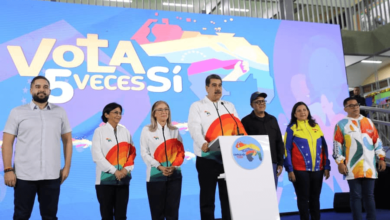Venezuela still bears the brutal marks of colonial exploitation and slavery. The subjugation of Indigenous populations and plantation slavery have resulted in legacies of discrimination towards Afro-descendant and Indigenous communities, who, for most of the country’s history, lacked a voice in the political system. Hugo Chávez was Venezuela’s first President to openly and strongly identify with this history, proudly proclaiming his Native and African roots.
Under Chávez’s leadership the Bolivarian Revolution engaged both communities, combining the struggle against chauvinism, bigotry and political marginalization into its broader revolutionary project. Further, in social and economic terms, the programs launched by the Bolivarian government have produced significant improvements amongst both the Indigenous and Afro-descendant populations.
While challenges still remain, a brief survey of the impact of the Bolivarian process on these communities, and in turn their impact on it, demonstrates the profoundly transformative nature of the revolutionary process as a whole.
Promoting Indigenous rights
Obtaining official recognition of their languages, identities, political structures and land rights has been a focus of Indigenous struggles. Additionally, questions of education and contradictions in the national development process have required new frameworks to embrace the rights of Indigenous peoples.
In the 1999 Constitution, the Bolivarian government established a legal framework for recognition of Indigenous peoples and their appropriate land titles, and has created vast social programs to deal with human, social and environmental development. The Organic Law on Indigenous Peoples and Communities stipulated that Indigenous peoples have the right to demarcate their ancestral territory to which they are granted rights. It establishes the rights to multi-lingual education, protects traditional medicines, and establishes a quota of seats for Indigenous persons in the National Assembly, as well as several other measures.
In 2003, the Venezuelan government established Misión Guaicaipuro which addresses Indigenous issues from various angles. Misión Guaicaipuro has been a central mechanism for land reform, delivering one million acres and land titles to Indigenous peoples. Further the Venezuelan government under Chávez extended its social missions to Indigenous areas, making significant gains in areas such as education and health. One creative adaptation of these missions to the needs of Indigenous populations was a roaming hospital established in 2008 designed to serve 418 remotely located Indigenous communities in the Orinoco Delta.
The struggles of Indigenous peoples in Venezuela however are far from over. The vast majority of the country’s 800,000 Indigenous live in rural areas that remain under the control of ultra-violent landowners who seize every opportunity to obstruct land reform. Assassinations and other forms of intimidation are routine. Recently the principal leader of the Yukpa people, Cacique Sabino Romero, was murdered by landowner-hired thugs.
Mostly cattle ranchers, these landowners will kill to retain their profits and have significant control over local governments. Using their long established networks of privilege, power and corruption inside the government bureaucracy, their supporters have maneuvered to slow down the implementation of laws and decrees favored by President Chávez. The battle against the bourgeois and counterrevolutionary elements within the bureaucracy has, for good reason, emerged as a central task of revolutionary socialists inside the PSUV (United Socialist Party of Venezuela) and was announced as a critical mission of the late President Chávez.
Additionally, the problems of border security and the development of natural resources have produced conflicts for the central government in giving unequivocal control of certain territory to Indigenous communities. While each of these conflicts would require their own detailed examinations, it is worth noting that they are to some degree inevitable. Compromises brokered by the government have drawn both opposition and support from Indigenous peoples, but the basic thrust and structure of the Organic Law has given the Indigenous a powerful tool in their overall struggle.
Venezuelans of African descent
It is estimated that over 100,000 slaves were brought to Venezuela during the trans-Atlantic slave trade. Today, by some estimates, there are 7 million Afro-descendant people living in Venezuela. The most recent census conducted in Venezuela (in 2011) was the first in the country’s history that allowed people to choose Afro-Venezuelan as their identity.
While formal Jim Crow-style racist apartheid was not a feature of Venezuelan development, racial discrimination has been persistent. Racist caricatures commonly appear in the mass media and there remain significantly higher rates of poverty in Afro-descended communities. The Bolivarian government has taken a number of initiatives aimed at combating bigotry directed towards Afro-descended peoples. For example, the 2009 Organic Law on Education requires all schools in Venezuela to teach the history of Afro-descended peoples. The law also bans the media from using racist caricatures. In 2011, the National Assembly passed the Organic Law Against Racial Discrimination to further strengthen the legal framework for combating racist bigotry.
To be sure, tremendous challenges remain to overcome the bigotry and inequality that have long been a feature of Indigenous and Afro-descendent communities in Venezuela. But there is no doubt about the overwhelmingly positive record of the presidency of Hugo Chávez in boosting these struggles.
Chávez’s own identification with his Indigenous and African heritage gave to them an added legitimacy, and his policies represented ambitious attempts to achieve social justice and equality.





